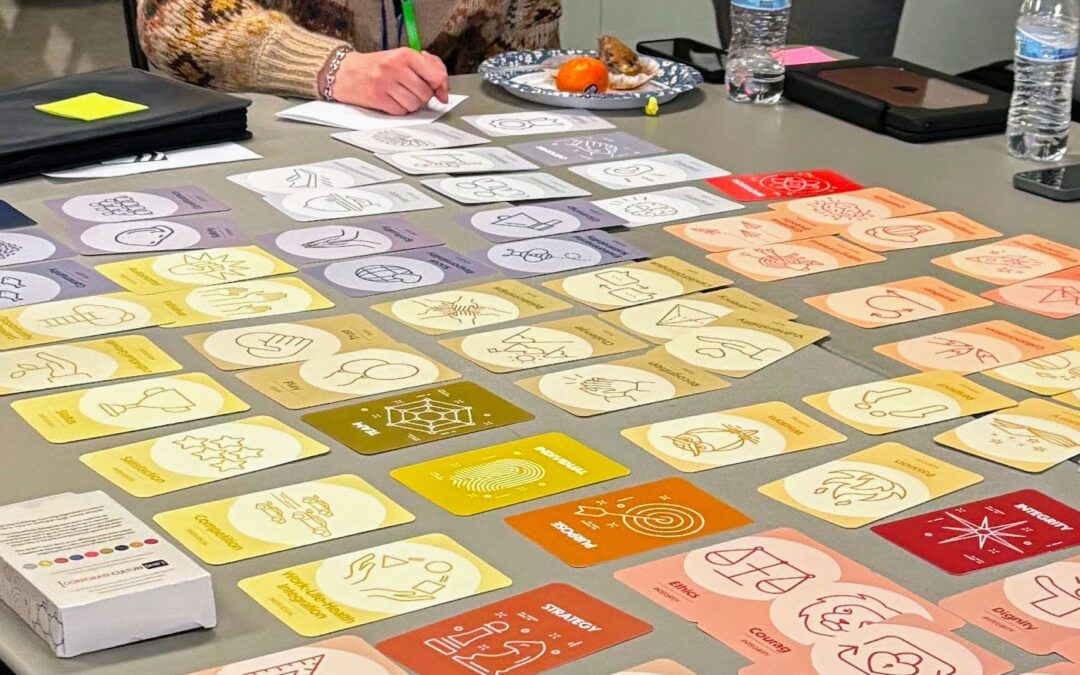Last week I facilitated a workshop for a team looking to deepen self-awareness and appreciation for one another. One of the tools I used was a values exploration activity—something I return to again and again in my work. What started as a playful, hands-on exercise quickly became something deeper: a window into each person’s motivations, priorities, and way of seeing the world.
As the group shared their individual values, connections began to form. Colleagues discovered where they aligned, where they differed, and how their values complemented one another. There was a noticeable shift—more curiosity, more trust, and a renewed appreciation for the people around them.
What Are Values and Why Do They Matter?
Values are often described as our personal guiding principles. They shape how we think, speak, and act. They influence our beliefs and behaviors. Our values reflect who we are and who we want to become. They help us grow. They help us decide. They help us show up.
When we’re clear on our values and lean into them, we operate with more energy, clarity, and confidence. But when our values are hidden, compromised, or at odds with our environment, that internal friction can be draining. We end up using energy to hold ourselves back instead of bringing our best forward.
Bringing Values to Work
Most of us adapt depending on where we are—one version of ourselves at home, another at work, maybe even a third in our communities. But the more we compartmentalize, the more exhausting it becomes. When we explore and honor our values—especially in team settings—we give ourselves permission to show up fully.
In my workshops, I often use a values card activity that prompts people to reflect on what matters most. It’s not about choosing “the right” values; it’s about claiming the ones that reflect who you are at your core. And when a team understands each other’s values, it becomes easier to collaborate, communicate, and care.
Values Build Trust and Connection on Teams
One of the most powerful outcomes of sharing values is that it breaks down assumptions. If someone says, “Collaboration is a top value for me,” we understand why they seek consensus and group input. If someone else leads with “Independence,” it makes sense that they prefer autonomy and ownership. Neither is right or wrong—they’re simply different.
Understanding this builds empathy. It fosters trust. It even helps prevent conflict. I’ve seen teams shift from tension to appreciation in just one conversation about values.
At one organization, a leadership team was struggling with a financial decision. Once they explored their individual values—stability, innovation, fairness—they were able to move forward with greater clarity and alignment. Values gave them a common language for making thoughtful, respectful decisions.
Aligning Personal and Organizational Values
When our personal values align with our workplace, we feel it. We’re more engaged, more satisfied, and more committed. In fact, research shows that value alignment is one of the biggest predictors of job satisfaction.
That’s why I often encourage teams to compare their personal values to the organization’s stated ones. Where do they line up? Where do they diverge? What needs attention or a conversation?
A good part of workplace well-being comes from being able to act in ways that are consistent with what we care about. When there’s a disconnect, frustration and burnout often follow.
Values Evolve—So Keep Asking
Our values aren’t fixed. They grow and shift as we do. After the pandemic, many people reevaluated their priorities and made major life changes. In many ways, that was a collective values reset.
That’s why examining your values isn’t a one-time exercise. It’s something to return to regularly. Our values both reflect the lives we’ve lived and help shape the lives we want to create.
Try This: Two Simple Ways to Explore Your Values
- Use a values list. Look through a list of value words and pick the ones that resonate with you. Narrow it down to your top five, then rank them. The process of choosing and prioritizing is incredibly revealing.
👉 Download my free values list here to get started. - Reflect on peak experiences. Think back to a time when you felt truly fulfilled at work. What was happening? What values were being honored in that moment?
Even better—do this with your team. Share. Listen. Learn.
Leading with Values
Whether you’re a team member, a manager, or an executive, values work is powerful. It’s personal. It’s practical. And it’s transformative. When we understand what drives us—and what drives those around us—we build stronger, more connected, and more effective teams.
And when people can bring their values to work, they can bring their whole selves. That’s where the magic happens.


Recent Comments